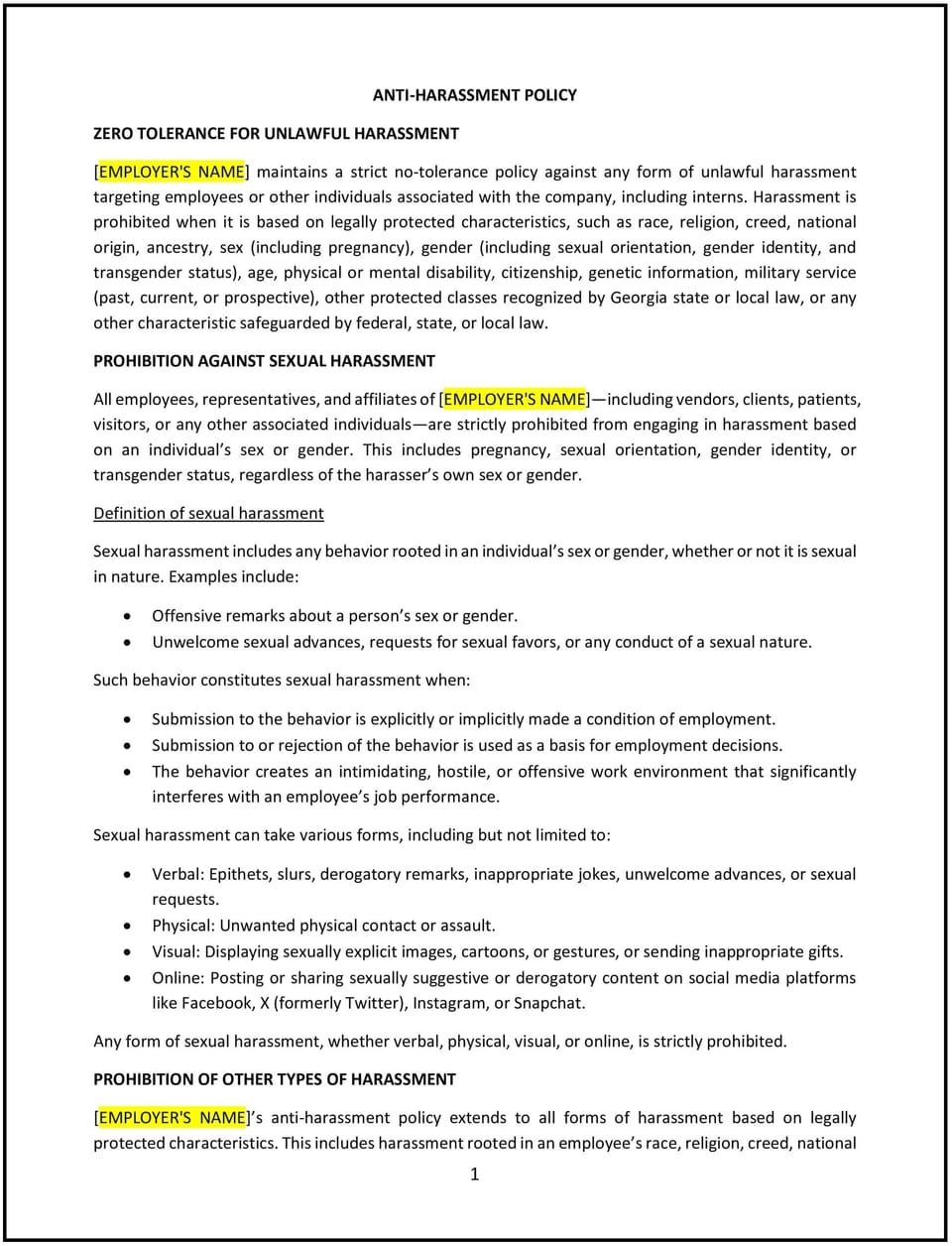Anti-harassment policy (Georgia): Free template

Anti-harassment policy (Georgia)
This anti-harassment policy is designed to help Georgia businesses create a respectful and inclusive work environment by addressing and preventing harassment in all forms. The policy outlines expectations for employee behavior, procedures for reporting harassment, and steps the company will take to address concerns and maintain a positive workplace culture.
By implementing this policy, businesses can promote a safe, equitable, and productive work environment while addressing harassment effectively and supporting affected employees.
How to use this anti-harassment policy (Georgia)
- Define harassment: Clearly define harassment, including verbal, physical, visual, and digital behaviors that create a hostile or intimidating work environment. Include examples, such as offensive jokes, unwelcome advances, or discriminatory remarks.
- Establish expectations for conduct: Set clear expectations for employee behavior, emphasizing respect, professionalism, and inclusivity. Communicate that harassment of any kind will not be tolerated.
- Outline reporting procedures: Provide a straightforward process for employees to report harassment. Specify how reports can be made, who employees should contact (e.g., HR, a designated officer), and the option to report anonymously if needed.
- Explain the investigation process: Detail how reports will be handled, including timelines for investigations, confidentiality measures, and steps to protect employees during the process.
- Prohibit retaliation: Emphasize that employees who report harassment or participate in investigations will be protected from retaliation. Clearly state the consequences for retaliatory behavior.
- Address consequences for violations: Outline the potential disciplinary actions for employees found to have engaged in harassment, which may include termination, suspension, or mandatory training.
- Offer support resources: Provide information about available support, such as counseling or employee assistance programs (EAPs), for individuals affected by harassment.
- Provide training: Require regular anti-harassment training for all employees, including managers and supervisors, to educate them about the policy, recognizing harassment, and appropriate responses.
Benefits of using this anti-harassment policy (Georgia)
Implementing this policy provides several advantages for Georgia businesses:
- Promotes a positive work environment: A clear anti-harassment policy fosters respect, inclusion, and collaboration among employees.
- Protects employee well-being: The policy helps employees feel safe and supported, improving morale and productivity.
- Reduces legal risks: Addressing harassment proactively reduces the likelihood of costly lawsuits and complaints with regulatory agencies.
- Supports accountability: Setting expectations and consequences ensures that employees understand their responsibilities and the importance of maintaining a respectful workplace.
- Reflects Georgia-specific considerations: The policy can address state-specific cultural and legal nuances, ensuring alignment with local business practices and values.
Tips for using this anti-harassment policy (Georgia)
- Communicate clearly: Ensure employees are aware of the policy, their responsibilities, and the resources available for reporting and addressing harassment. Regularly remind employees about the importance of maintaining a harassment-free workplace.
- Involve leadership: Encourage managers and executives to model respectful behavior and actively support anti-harassment efforts. Leadership buy-in strengthens the policy's impact.
- Monitor workplace culture: Regularly assess the workplace culture to identify any areas where harassment or disrespect may be more likely to occur. Proactively address concerns before they escalate.
- Encourage early reporting: Create an environment where employees feel comfortable reporting harassment at the earliest stages, allowing businesses to address concerns promptly and effectively.
- Regularly review the policy: Update the policy to reflect changes in Georgia’s laws, workplace dynamics, or industry best practices. Ensure it remains relevant and effective in addressing harassment.
Q: What behaviors are considered harassment?
A: Harassment includes any unwelcome conduct that creates a hostile or intimidating work environment. This may include verbal abuse, inappropriate jokes, physical intimidation, or offensive visual displays.
Q: How should employees report harassment?
A: Employees should report harassment to their manager, HR, or the designated officer responsible for handling such complaints. Businesses should provide options for confidential or anonymous reporting.
Q: What happens after a harassment complaint is filed?
A: The business should initiate an investigation promptly, maintaining confidentiality to the extent possible. Employees involved will be informed of the process and steps being taken to resolve the issue.
Q: Are there consequences for false reports?
A: While all reports will be taken seriously, employees who knowingly make false accusations may face disciplinary action. This is to ensure the integrity of the reporting process.
Q: How are employees protected from retaliation?
A: Employees are protected from retaliation under this policy. If retaliation occurs, businesses should investigate promptly and take disciplinary action against those responsible.
Q: What training should be provided to employees?
A: Businesses should offer training on recognizing harassment, reporting procedures, and fostering a respectful workplace. Training should be mandatory for all employees and conducted regularly.
Q: Can harassment occur outside the workplace?
A: Yes, harassment can occur outside the physical workplace, such as at work-related events, during business travel, or online through work communication platforms.
Q: How often should this policy be reviewed?
A: The policy should be reviewed annually or whenever there are changes to Georgia’s laws or workplace circumstances that impact anti-harassment measures.
This article contains general legal information and does not contain legal advice. Cobrief is not a law firm or a substitute for an attorney or law firm. The law is complex and changes often. For legal advice, please ask a lawyer.


